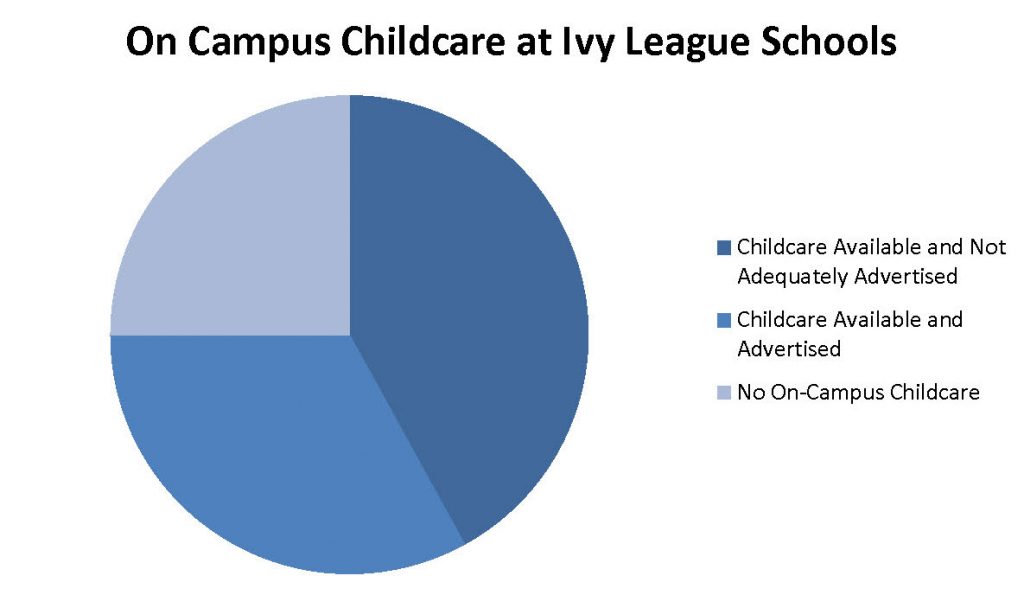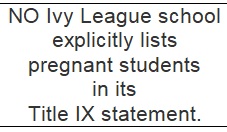Report on Resources and Support for Pregnant and
Parenting Undergraduate Students Attending
Ivy League Universities
By FFL President Serrin M. Foster
and
Jillian Shea
October 24, 2018
Summary
Being admitted to and attending an Ivy League school is a major accomplishment, especially as a young woman, since it wasn’t until 1983 that all of the schools were officially co-ed. By successfully graduating from the same rigorous institutions that men had been graduating from since the creation of this country, women proved that they, too, were incredibly smart and hardworking. The story of creating space for women in the Ivy League has been clearly illustrated in pop culture as Legally Blonde follows Elle Woods to Harvard and Gilmore Girls follows Rory Gilmore to Yale.
Still, we couldn’t help but wonder: What if Elle or Rory found herself pregnant while she was away at college? Would her respective school be able to meet her needs? In an attempt to answer these questions, Feminists for Life reviewed the eight Ivy League schools to see if they are able to meet the needs of their pregnant and parenting undergraduate students. The schools were evaluated based on their policies regarding pregnant students, child care options, availability of lactation rooms and diaper decks, health services, and several other features that help students both parent and accomplish their coursework. Our surveys revealed some strengths as well some areas that could be improved upon:
-100% of Ivies have lactation rooms on campus.
-100% of the student health insurance plans offered by Ivies provide coverage for prenatal care.
-100% of Ivies have counseling services available for students who are experiencing reproductive grief.
-75% of Ivies offer on-campus child care, but of that 75%, only 33% explicitly state on their website that they are an available resource for students, but they are very expensive.
-0% of Ivies offer family housing for undergraduate students (not in Columbia’s policy, but it is a tab in Title IX page).
-Only 12.5% of Ivies explicitly list a central place for pregnant students to go for help .
-0% of schools explicitly include pregnant students in their Title IX policies.
What is most revealing is that respondents from Brown, Columbia, Cornell, Dartmouth, Harvard, UPenn, Princeton, and Yale have reported that they are generally not aware of any visibly pregnant and parenting undergrad students and rarely as grad students.
In reviewing these results, Feminists for Life of America would like to first commend the Ivy League for helping students obtain the medical services necessary while pregnant.
None of the Ivy League schools, however, explicitly includes the rights of pregnant women in its Title IX policies. Pregnant students are already protected by Title IX, so FFL recommends that the Ivy League make the protection of pregnant students evident in their Title IX policies so that students are aware of these rights.
FFL also recommends that the Ivy League expand child care options. If on-campus child care centers are open to students, they should make it evident that they are a resource for students to use. If they are not currently open to students, they should evaluate what measures might be taken so that they can accommodate parenting students. These universities should also take measures to offer subsidies for students who may have difficulty affording child care.
FFL also recommends that the Ivy League expand their housing options for students who are parenting.
Introduction
The purpose of this study is to evaluate the available resources for pregnant and parenting students at the eight Ivy League schools and to make recommendations for next steps to expand access, improve resources and support, and increase graduation rates for pregnant and parenting students.
Title IX protects students from discrimination on the basis of pregnancy and protects students who need to take a leave of absence due to pregnancy. But according to a September 2017 report from the Institute for Women’s Policy Research (IWPR), only a minority of single mothers actually graduate. The number of single mothers in college more than doubled between 1999 and 2012— coming to represent close to one in five of all women in college, or 11 percent of all undergraduates. The study cites financial obstacles that got in the way, the demands of working full or part time, the cost of child care (and continued elimination of on-campus day care), and lack of family housing as reasons single mothers do not graduate.
Women of color in college are especially likely to be single parents. Nearly two in five black women (37 percent) and over one-quarter of American Indian/Alaska Native women (27 percent) are raising a child on their own while in college, and 14 percent of white women are single parents in college. Nearly one in five Hispanic and multiracial women students (19 percent and 17 percent, respectively) are single mothers, while Asian/Pacific Islander women are least likely to be raising children in college (7 percent), according to the IWPR.
Furthermore, MarketWatch reports for-profit colleges—which tend to leave students with higher debts—target single-parent students. Single mothers comprise 26 percent of for-profit college students, MarketWatch finds.
Facing substantial amounts of student debt, single mothers in college must find affordable, convenient child care options. Many universities have cut their child care budgets, allocating funds to other amenities, according to Refinery29. The number of public four-year colleges with child care decreased 5 percent between 2005 and 2015, Refinery29 reports.
The need to find a path forward to support parents, especially single mothers, is obviously urgent. The latest report from IWPR is even more explicit in the urgency of who needs services now: parents who are nontraditional older students. An IWPR briefing paper released on February 20, 2018 describes the “new college majority,” finding more than half (51 percent) of college students are now what used to be considered “nontraditional”—financially independent, over age 24, and with children (dependents) of their own, among other characteristics. They are most likely financially independent women (55 percent) and students of color (55 percent). Half are parents of young children. They are twice as likely than traditional students to be living in poverty. Two-thirds of them work on top of going to college, and most of them work more than 20 hours a week. They are also less likely to graduate.
Students who achieve their postsecondary degrees earn $17,500 more than those with a high school degree, GED, or no high school degree, according to a 2014 Pew Research study. Making college doable for single mothers is crucial to helping them avoid poverty and debt.
Feminists for Life of America’s Expertise
Feminists for Life of America’s report inventories resources and support for student parents attending California state universities and makes recommendations for a path forward to increase graduation rates.
In January 1997, Feminists for Life of America President Serrin Foster led the first-ever FFL Pregnancy and Parenting Resource ForumSM at Georgetown University. Her moderator outline became the basis of the FFL Pregnancy and Parenting Resource Survey, later shared with other organizations and campuses across the country.
In 2008, FFL published “Perception IS Reality,” a nationwide study of students’ knowledge of the resources available to pregnant and parenting students on campus. With 165 respondents at 117 colleges and universities, public and private, the survey found:
• 78% had flexible class times, and 53% had online class options.
• Nearly 50% said they had no family housing on campus, and 31% did not know about family housing.
• 31% were aware of on-campus child care available.
• 77% did not know if student health services covered maternity/prenatal care.
• 77% reported no lactation rooms on campus.
• 50% did not know if their schools had an office specifically for pregnant and parenting students.
• 69% did not know if their state provided financial aid for pregnant/parenting students.
FFL inspired model legislation in support of pregnant and parenting students in Michigan in 2004. A federal version of that bill, titled the Elizabeth Cady Stanton Pregnant and Parenting Student Services Act, passed the U.S. House in 2007 with wide bipartisan support as the Hart Amendment. And in 2010, the Pregnant and Parenting Student Services Act inspired the Pregnancy Assistance Fund, federal grants distributed by the U.S. Department of Health and Human Services to states and tribes for the purposes of health care, housing, child care, and flexible scheduling, such as online classes.
Feminists for Life has been advocating on Ivy League campuses for pregnancy resources and support since 1997 at Cornell and Columbia, Harvard in 1998, Dartmouth and Princeton in 1999, Yale in 2000, University of Pennsylvania in 2005, and Brown in 2006, for a total of 29 events, including:
• Ms. Foster taking part in a historic debate at the John F. Kennedy School of Government, Harvard in 2000 at the invitation of Sen. Simpson. In closing remarks, Foster challenged Gloria Feldt, then President of Planned Parenthood Federation of America, to work with FFL to advocate housing, child care, maternity coverage, and more on-campus resources.
• The following year, Ms. Foster returned to moderate the first FFL Pregnancy Resource Forum℠ at Harvard in 2001.
• A parliamentary-style debate at the Yale Political Union debating the motion “Pro-Life Is Pro-Woman” in 2016, which we won after Foster asked attendees if they had ever seen a visibly pregnant student or parent. The debate lasted over three hours and was debated by seven political parties. FFL made history by sponsoring the first pro-life resolution ever to win a YPU debate.
Methodology
Using FFL’s pregnancy resource survey, the researcher ascertained the available resources by reviewing the websites of Brown University, Columbia University, Cornell University, Dartmouth College, Harvard University, University of Pennsylvania, Princeton University, and Yale University.
A detailed list of the results of FFL’s Pregnancy and Parenting Resource SurveySM may be found here. All information was collected during the summer of 2018.
Child Care
While 75 percent of Ivy League Schools (Columbia, Cornell, Dartmouth, Harvard, University of Pennsylvania, and Princeton) have on-campus child care from three months to five years, only 33 percent (Cornell and UPenn) explicitly advertise it as a resource for their students to use. The on-campus child care for Dartmouth, Harvard, and Princeton does not appear to be open to students, only to faculty, administration, and staff.
Moreover, the price to attend these centers, is quite high and not necessarily affordable on a student budget. No student subsidies are listed for undergraduate students, but Brown and Cornell do have some subsidies for their graduate students. However, many of the schools seem to have day care fees on a sliding scale.
Brown and Yale do not have on-campus child care facilities, but they are affiliated with other child care centers off campus. Yale does not specify if students are able to use these centers, and while it’s clear that graduate students can use the affiliated child centers, it isn’t specified as to whether or not undergraduates have access to this resource or not.
Resources for Nursing Mothers
Each Ivy League school has at least one lactation room on campus, and both Cornell and UPenn include the locations of lactation rooms on their online interactive campus maps.
Pregnancy and Parenting and Title IX
Although none of the Ivy League schools explicitly addresses the rights of pregnant and parenting students in its Title IX policies, they cannot discriminate against them according to federal law. All of the Ivy League schools have a Title IX coordinator who can be contacted to assist students who have been discriminated against on the basis of pregnancy.
In addition to a Title IX coordinator, Cornell University also has a “Students with Families” committee that can be contacted to address any questions about parenting as a student at Cornell. This committee can help expectant students, parenting students, and their spouses or partners.
Health Services
All of the student health insurance plans offered by schools in the Ivy League provide coverage for prenatal care. Unfortunately, Dartmouth’s health center does not list the services it provides to students who find themselves pregnant. All of the other Ivies, however, provide some sort of counseling regarding one’s options after having a positive pregnancy test for those who have their student health insurance. Similarly, those with student health insurance can receive prenatal care on campus at Harvard and Yale and can be referred to OB-GYNs in their community at Columbia, Cornell, UPenn, and Princeton.
In addition, all of the Ivy League schools do offer counseling services where students can process reproductive grief.
Family Housing
None of the Ivy League schools provides housing options for students with children at the undergraduate level.
Conclusion
Completing one’s education is imperative to end the feminization of poverty, and the ability to do so at the same rigorous institutions as men is necessary in making sure that women have equal access to a quality education and equal opportunity to pursue their career goals.
After analyzing the available resources and support, Feminists for Life of America makes these recommendations to address the the graduation disparity among single women.
We used information revealed by the Institute for Women’s Policy Research, by our more than two decades of work on campus to facilitate resources, and by listening to pregnant women, expectant fathers, parents, and birthmothers:
• Include support for pregnant and parenting students and birthmothers in online Title IX statements, orientation, and related communications.
• Take a census of pregnant and parenting students on campus so that the university can create and provide the amount of resources necessary to assist these students.
• Establish a central place on campus for serving pregnant women, parents, and birthmothers.
• Expand affordable and accessible child care: All eight Ivy League schools are affiliated with child care centers, six offer it on campus, and two specify that it is available for student use. If possible, schools should expand their child care centers to accommodate for parenting students and seek to provide students with loans, subsidies, and scholarships to meet students’ financial needs. Child care centers can also consider creating a sliding scale tuition rate to make themselves more accessible for parenting students.
• Establish family housing for undergraduate students and expand the housing options for graduate students. While none of the Ivy League schools offers undergraduate family housing, 75 percent of them offer graduate family housing. As a first step, these universities can allow undergraduate students to use the graduate family housing in order to help undergrads continue their studies while parenting.
• We encourage administrators to use “FFL Recommendations for Best Practices at Colleges and Universities Serving Pregnant and Parenting Students” as they create a blueprint for progress.
• Students and administrators are also invited to take FFL’s Pregnant and Parenting Resource Survey to help assess the resources available on and off campus and work collaboratively with administrators as they advocate for better support. (FFL’s findings can be read here as of 2018.)
• We also encourage alumni of these universities to donate to their alma maters to help provide and develop these resources.
• Most important, however, the Ivy League needs to make a conscious effort to develop a culture that supports pregnant women, expectant fathers, parents, and birthmothers. Expanding the resources for these students will help foster this culture, but there also needs to be an effort to foster attitudes that support women in their endeavors to both parent and complete their degrees.
FFL invites the administrators of the Ivies to contact us at info@feministsforlife.org to make clarifications about the resources they have for pregnant and parenting students on their campuses and/or to inform us of updates they have made to these resources. FFL will happily update this report accordingly.
Finally, Feminists for Life offers our assistance and recommends annually hosting an FFL Pregnancy Resource Forum as Georgetown University has done since January 1997, and most recently this past Tuesday, October 16, 2018.
Ms. Foster and Ms. Shea wish to acknowledge the contribution of Kellan Monroe, who helped with this report.
To read the individual Ivy League survey results, click here.
To read the press release, click here.









